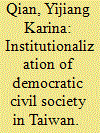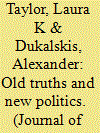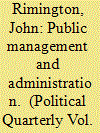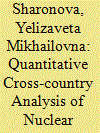| Srl | Item |
| 1 |
ID:
091106


|
|
|
|
|
| Publication |
2009.
|
| Summary/Abstract |
A young democracy, Taiwan lacks agencies of horizontal accountability and aspects of a thick rule of law. This paper examines how an institutionalized, democratic civil society has held the antiquated judiciary vertically accountable for violations of due process in the famous Hsi-Chih Trio death penalty case.
|
|
|
|
|
|
|
|
|
|
|
|
|
|
|
|
| 2 |
ID:
117593


|
|
|
|
|
| Publication |
2012.
|
| Summary/Abstract |
This article analyzes the relationship between truth and politics by asking whether the 'publicness' of a truth commission - defined by whether it has public hearings, releases a public report, and names perpetrators - contributes to democratization. The article reviews scholarship relevant to the potential democratizing effects of truth commissions and derives mechanisms that help explain this relationship. Work from the transitional justice field as well as democratization and political transition more generally is considered. Using a newly-constructed Truth Commission Publicness Dataset (TCPD), the analysis finds that even after statistically controlling for initial levels of democracy, democratic trends in the years prior to a commission, level of wealth, amnesties and/or trials, the influence of the South African Truth and Reconciliation Commission, and different cutoff points for measuring democratization across a number of models, more publicness predicts higher levels of democracy years after the commission has finished its work. The more public a truth commission is, the more it will contribute to democratization. The finding that more public truth commissions are associated with higher levels of democratization indicates particular strategies that policymakers, donors, and civil society activists may take to improve prospects for democracy in a country planning a truth commission in the wake of violence and/or government abuse.
|
|
|
|
|
|
|
|
|
|
|
|
|
|
|
|
| 3 |
ID:
092650


|
|
|
|
|
| Publication |
2009.
|
| Summary/Abstract |
Recently, British public management has relied too much on private sector approaches suited to market-facing situations, to the detriment of systems based on a realistic estimate of the special nature of public business, and its needs for economy and co-ordination. Accountability processes have suffered from over-simplification (targetry) and from a gross multiplication of mechanisms focusing on individual error, as opposed to ensuring intelligent assessment of business results. There has been an over-emphasis on management of inputs and outputs, as opposed to systems gearing the result-producing mechanisms to means for policy formation and co-ordination of effort. We need now to re-think and define properly the systems whereby ministers are advised, account is rendered, resources are allocated and effort is co-ordinated-and the qualifications of the relevant actors. Suggestions are made to these ends
|
|
|
|
|
|
|
|
|
|
|
|
|
|
|
|
| 4 |
ID:
180249


|
|
|
|
|
| Summary/Abstract |
Nuclear power has always been a controversial issue since it was discovered as a source of power for civil use. Despite being a global phenomenon, nuclear power is viewed differently around the world, and consequently, different discourses have had different outcomes. This study does a comparative analysis of nuclear power discourses between India and Russia, two countries of distinct political systems. This study analyses the media coverage and content of the main discourse themes in India’s and Russia’s print media from March 2011 to March 2019. The study finds that in both countries, despite their different political set-ups, nuclear power discourse has a pro-nuclear character.
|
|
|
|
|
|
|
|
|
|
|
|
|
|
|
|